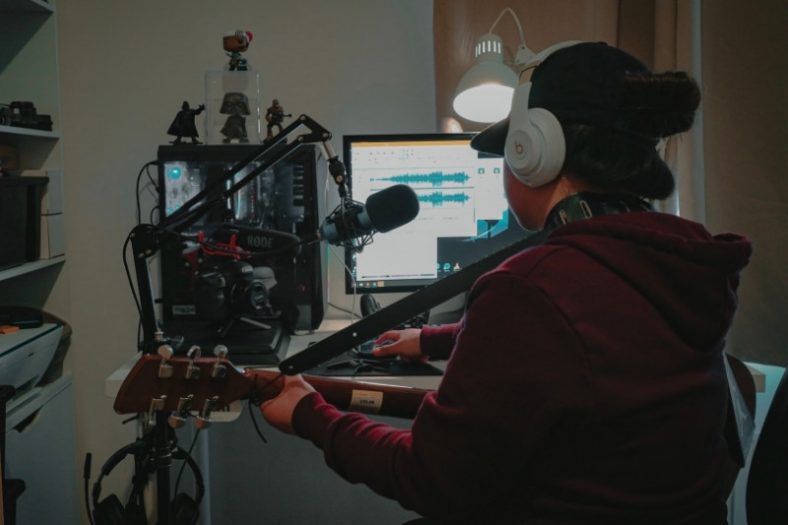10 Reasons Why Musicians Fail

It’s difficult for artists to break into the music business, and unfortunately most of them fail because it’s an extremely competitive market. We’ll go over ten reasons why musicians fail.
We will define success based on the commonly held view of what it takes to make it in music. This can be anything from getting a large following to being on a big stage of a festival.
Do you absolutely LOVE writing and performing music?
What kind of music do you want to play?
Do you want to be a solo performer or make it big in a band?
Do you want to just make a living from music?
Do you simply want to become a competent musician and contribute to local music gatherings?
Would you be interested in having 10 million fans of music that you’re NOT passionate about?
It might be much more worthwhile to have 100 thousand fans in a music genre you love! Success should be what YOU want and believe in.
Whatever your goals for success are, let’s get down to the reasons why most musicians fail.
There are some exceptions to these rules. For example, some artists have made it big overnight in the pop world. However, what may seem like an overnight success might not actually be the full truth.
Contents
- 1. Struggling For Perfection
- 2. Not Persisting Enough
- 3. Not Actively Working With Other People
- 4. Not Creating Anything New
- 5. Not Believing In Yourself
- 6. Not Actively Building a Fan Base
- 7. Not Finishing Songs
- 8. Feeling Like You’re Not Being Treated Fairly
- 9. The Songs Are Badly Recorded/Produced/Mastered
- 10. Not Practicing Enough
- Summary
1. Struggling For Perfection

Music is an art. It needs to be great. You need to work on it for a long time before it’s ready.
But eventually, you need to release and play your music to crowds. In the modern music industry, you also may need to release new music very regularly to stay relevant.
Work on your craft, be better every day, but also, start getting your music out there.
You can release your music on many platforms such as iTunes and Spotify using a music aggregator (either free with a royalty cut or at a relatively low fee). It’s really easy to do and you don’t need to be part of a record label.
2. Not Persisting Enough
The music industry is saturated with musicians, but you can still make it to the top!
Bloggers and record labels get hounded on a daily basis by countless new acts.
You have to keep going in the face of rejections…
You need to stay persistent enough to get through countless rejections and let downs. Being persistent will just show you and other people that you deserve to be here.
If you truly believe in your music, you must never give up.
People may ignore you until you get a big break or media coverage
Listen to the opinions of others, but also take them with a pinch of salt. If you’ve got big plans then you might be the only one that believes in them at the start.
Naysayers would probably change their opinion of you if you started getting recognized.
As local acts go, you are never appreciated until someone who is not local appreciates you first. Everyday listeners often need some ‘social proof’ to get invested in tracks.
3. Not Actively Working With Other People

Sitting alone in your bedroom is probably not going to do wonders for your music career.
The music industry takes collaboration to a whole new level.
Getting out and meeting people
Even if you’re a solo performer, you may need to make contacts with labels, venues, fans, bookers, managers, promo people, music supervisors, etc.
Starting off can be really tricky for musicians. Oftentimes, who you know can be the path to a big break.
You should try to get involved with a music scene if there is one available in your area. If not, then pick the closest city and get involved whenever possible.
Getting involved with bands and other musicians
Maybe you’re stuck in a band that’s going nowhere. Maybe you’re missing a bit of drive in your solo project.
Think outside the box and consider collaborating with other local musicians. You might come up with something great.
Some people work great by themselves, others need to be part of a group. Try to find out what works best for you.
Collaborating with musicians online
There are a bunch of collaboration websites for musicians that are useful if you’re looking for somewhere to start. This is particularly useful for music producers and singers.
4. Not Creating Anything New
Big artists do something different. They stand out from the crowd in some way:
- Music style or creativity
- Exceptional skill at their craft
- Fashion style and attitude
- Performance skills
- Other miscellaneous gimmicks!
If you’re just trying to rehash the ideas of other people then it may sound dull and old.
Perhaps you’re creating music for a genre that has lost popularity. Maybe you’re trying so hard to be like a particular famous artist that you pale in comparison to them.
It’s no harm to compare and reference your music against the best in order to make sure the production of it is up to scratch. Though if you’re not trying to inject your personality or some sort of creativity into the mix then it might be difficult to get anywhere.
5. Not Believing In Yourself
Can you visualize yourself being on a big stage? You may not be ready to be there right now, but you need to BELIEVE that you WILL be there one day.
If you don’t fully BELIEVE then you need to rethink your goals OR rethink your approach.
If you’re thinking “I’m never going to be as good as _____“, or “This is all too hard“, or “I’m never going to get there“, then you have probably already failed.
You’re not going to put in the tremendous effort required to be a successful musician if you don’t fully believe in yourself.
When you’re getting rejected by bloggers, playlist curators, labels, venues, fans and haters… what’s really going to keep you going is your self-belief.
If you don’t have self belief, you’re going to give up. Giving up is failing by default.
6. Not Actively Building a Fan Base

You need to start building a fan base as soon as you start performing or releasing tracks you believe in.
- Take a bit of time to set up your social media profiles.
- Get an email list together such as MailChimp: Email is still very powerful and you’re in much more control of it.
- Create a music website: You’re in total control of this.
- If a fan sends you a message, take the effort to respond to them and maybe get to know them. They may turn out to be your biggest promoters. It’s also just a nice thing to do!
A mailing list of a few thousand fans can go a long way. There are many creative ways to capture email addresses (just make sure you get permission first). You could try to collect email addresses at gigs, have a popup on your website, or run a competition.
7. Not Finishing Songs
Finish what you start. It’s very easy to get your material lost in the graveyard of half finished songs.
If you’re struggling to finish your songs, it can take a lot of discipline to get back on track.
Study the arrangement and song structures of other tracks. Don’t copy them, but try to get some inspiration for how they do it.
Mix and mastering engineers almost always reference other great tracks during their work. Don’t be afraid to get some inspiration (that said, there’s a big difference between inspiration and stealing!).
If you endlessly tweak a song for too long, you run the risk of overcooking and ruining it. You may try to mash too many ideas together. By the end, you will probably be so sick of the song that you’ll want to give up on it altogether!
When they’re ready, let them rest for a while. If you’re happy with them after that, get them ready for release!
8. Feeling Like You’re Not Being Treated Fairly
First off, I agree that musicians are often treated very unfairly. Though you’re going to fail if you let it take you down.
The world is a cruel place. Venues and festival organizers often ask musicians to perform and don’t pay them a cent.
Unfortunately, as much as music is an art, it’s also form of entertainment and a business.
Venues care about their bottom line. It’s capitalism. When demand for your act goes up, your demand will go up, you will start to draw crowds, and venues will start paying you.
When you can draw a crowd, you’re in a much better bargaining position to look for decent pay. Before that, you’re not going to be making a lot of money.
There are movements and organizations to support fair treatment of musicians. I commend their efforts. However, I think these will only ever get minor rewards for musicians, if any.
You may decide to not play gigs without pay, but the reality is that there are potentially hundreds of other acts that are willing to play for no money in return.
I’m not saying it’s fair. That’s just the way it currently is.
Stay positive, believe in yourself, get exposure and build a fan base. You’ll slowly start to feel that the world isn’t against you!
9. The Songs Are Badly Recorded/Produced/Mastered

The production standard of commercial music releases is REALLY high. You can totally match it if you put in the effort.
Do your music justice
If you’ve been making music for quite a while and still releasing badly recorded demos, then please get real and start investing in your sound.
You might see the potential in your music, but unless it’s presented really well, even experienced people in the industry will probably skip past it.
Perhaps you’re the one recording/producing, mixing, and mastering your tracks. Maybe somebody else takes care of it.
Compare your songs against a reference track
Try to move back and forth between a song of yours and a suitable reference track. A good reference track is in a similar genre with a relatively close sound to yours. Also, make sure that you’re using a good reference and sounds great.
Consider the following, the questions will vary based on your style of music.
- How do the instruments, harmonies, melodies compare?
- How do the vocals in my songs compare?
- Do the vocals come out enough in your track?
- If applicable, is there too much vocal processing on your track?
- Is there enough punch in the percussion, drums or kick?
- How does the bass compare?
- Which track is louder?
- Does your track seem muddy or unclear in comparison to the reference track?
- Is your track missing background sounds or effects?
- Is there just ‘something’ about your track’s that you feel is missing?
If your tracks compare negatively to the reference on a few of the above questions then it may be badly produced.
Do you produce your own music?
If you produce your own music then consider learning how to improve your mixing. Also, consider getting a mastering engineer to master your tracks. There are plenty of great mastering engineers online that you can use the services of.
A mastering engineer not only can help polish the sound and bring the volume up to the level of the reference track, they can also serve as the ‘QA’ resource and give you some great feedback on your mix.
Somebody else records/produces your music
If you think your tracks are produced badly then you need to consider getting somebody else to do it.
Life it too short to pay people that are doing a sub-par job.
Perhaps the engineer that you use is inexperienced with your style of music. Maybe the studio has bad sound. Maybe the producer’s creative input into the track does not suit your style.
10. Not Practicing Enough
This can be seen as the opposite to point 1 (‘Struggling For Perfection’), but you could be suffering from both issues at once.
Practicing the wrong areas
You may be practicing a lot, but you might not be focusing on what’s important for your music success.
Perhaps you’re a drummer for an electro-pop group. Instead of getting super-tight on playing to a metronome live, you spend your time practicing styles and techniques that will get little use in your genre.
Maybe you’re a singer/songwriter that’s spending too much time working on your guitar playing and not enough on your vocal range.
There can be a million and one scenarios similar to the above!
The point is… try to focus on what’s important. What’s going to help you perform and bring out more music? Try to do more of that.
Putting too little time into your craft
You may have decided you’re good enough at playing your instrument and you have stopped learning.
Herbie Hancock, the famous Jazz musician, talked about hoping he can be better tomorrow then he is today. Herbie is an ultra-successful musician.
You need to keep learning. Try to get better at your craft on a daily basis.
Depending on your instrument:
- Get a music teacher! Even if you’re very experienced, try to seek the tuition of a professional music teacher. They can help to figure out areas for improvement and get you motivated to start learning again.
- Play a different style of music
- Study the arrangement of other music
- Actively listen to other tracks – get a pen and paper out and study how other great songs are put together. You might actually learn something!
- Take some tutorials online
Summary
That’s why most musicians fail.
Unless you commit and fully dedicate yourself, the goal of reaching music success will forever be out of reach.
Follow the points in this article, read some books by great musicians, take some music courses, get out there and meet people, promote your music with a new-found energy.
Most importantly, don’t give up.
If you keep going, keep enjoying it, and keep loving the gift of music, then success will follow.





